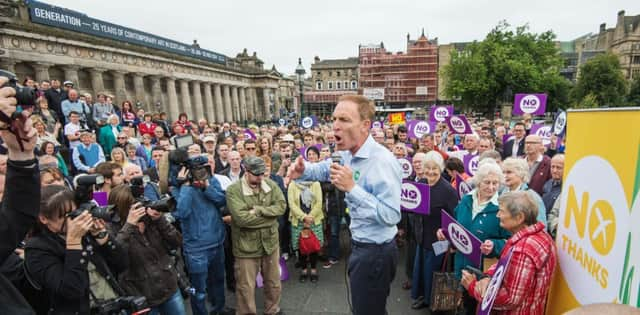Euan McColm: Indyref2 sure to be a bruising affair


There is a great myth, largely propagated by supporters of Scottish independence, that the referendum on 2014 was a joyous affair, a great celebration of democracy enjoyed by all participants. And it is undoubtedly true that, for many Yes campaigners, newly engaged with politics, the campaign three years ago was a thoroughly invigorating business.
In truth, not everybody felt that way.
To those who supported the maintenance of the United Kingdom, the referendum campaign was often unsettling, worrying, and exhausting; not everybody is enthused by flag-waving crowds at triumphalist rallies, not everybody enjoys shrieking protests.
Advertisement
Hide AdAdvertisement
Hide AdIn 2014, the increasingly shrill tone of debate, nasty scenes of Yes campaigners abusing pro-Union politicians in the street, and conspiracies of media and civil service interference (often encouraged by former First Minister Alex Salmond) combined to create an unpalatable broth.
But, if you think the last referendum was divisive, you’ve seen nothing yet.
Nicola Sturgeon’s announcement on Monday that she intends to call a second independence referendum either last next year or early in 2019 was the news that hopeful Yes campaigners have been longing for ever since defeat last time round. Those activists have never lost their faith that all that’s needed in one final heave before the UK comes crashing to its necessary destruction.
Those who voted No in 2014 - and who expected the result of that referendum to settle matters for, as senior SNP figures repeatedly told us “a generation”, will have felt their hearts sink as news of the second referendum emerged.
The battle over the constitution has reshaped Scotland’s politics (just as the result of the EU referendum is now doing south of the border). Old arguments between left and right have gone to be replaced by a debate that rarely looks beyond the question of whether or not Scotland should be an independent country.
This new binary debate has done wonders for the SNP’s fortunes. As by far the largest of the pro-independence parties, the SNP has gained the electoral support of the majority of Yes voters. Meanwhile, No voters’ loyalties are split between the Conservatives, Labour, and the Liberal Democrats. The inevitable consequence of this state of affairs has been SNP dominance in elections to Westminster in 2015 and to Holyrood last year.
But for all the nationalists’ electoral success, polls show the true story when it comes to the constitutional question is that the majority of Scots currently neither wish to leave the UK nor to participate in another vote on the subject. Before the question is agreed or a timetable fixed, the tension between opposing sides is already abundantly clear.
A number of pro-independence campaigners reacted to Miss Sturgeon’s announcement on Monday by speaking up about the need for the debate to come to be carried out respectfully and honestly. This is a lovely idea but it’s not going to happen.
Advertisement
Hide AdAdvertisement
Hide AdIndyref2 will be bruising and unpleasant. It could be no other way.
Yes campaigners - comprehensively defeated last time despite SNP spin that 55-45 represents a close-run thing - had nothing to lose in 2014; for generations, Scottish nationalism had been a minority interest and the Holyrood voting system would prevent the SNP from winning the parliamentary majority needed to call a referendum. The nationalists’ surprising majority in 2011 provided the opportunity for a constitutional vote that many in the Yes movement never truly believed would happen.
By any standards, the SNP - and its fellow nationalists in the Greens - achieved a great deal in the course of that referendum campaign; the rise in support for independence from less than 30 per cent to almost 45 is undoubtedly significant. But no amount of manoeuvring by the SNP since 2014 has been able to create a pro-independence majority.
The SNP does have things to lose, this time around.
Defeat in the last referendum was seen by nationalists as a blip. They took from the result the positive message that support for their position was growing (and ignored the equally clear message that they lacked credible answers on major issues such as currency) and became even more disciplined in their pursuit of another vote.
The loss of a second referendum would not be shrugged off so easily. Miss Sturgeon would have little choice but to resign with, since there is little evidence of political talent among the next generation of Scottish nationalist MSPs, grave consequences for the future stability of her party.
It is worth remembering that the SNP was first elected to govern in 2007 with the backing not only of nationalists but of unionists. These pro-UK voters were told by Alex Salmond that support for his party need not mean support for independence. This reassured, these voters were willing to give the SNP a chance to take control at Holyrood.
Since then, the SNP has built a reputation for competent government (though, apart from the repeated assertion by nationalist ministers that they are competent, there is little evidence to suggest that reputation is at all warranted).
The second independence referendum, then, could see the SNP lose the electoral support of voters who prefer the nationalists’ “competence” to their constitutional ambitions.
Advertisement
Hide AdAdvertisement
Hide AdThe last referendum on Scottish independence - still so fresh in the memory - was a frequently angry business. With the stakes even higher in a future vote, expect thing to get nastier, still.
Regardless of who wins indyref2, Scotland is about to become a much less pleasant place to live.